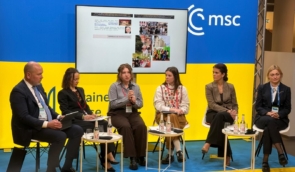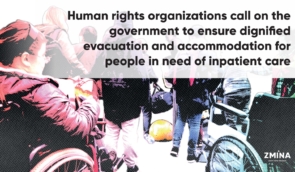10th anniversary of Crimea.Realities project was celebrated in Kyiv
On March 26, the Crimea.Realities project of Radio Liberty celebrated its 10th anniversary at the Crimean House in Kyiv. The event was attended by Ukrainian media professionals, representatives of the authorities, public organisations and the cultural sector.
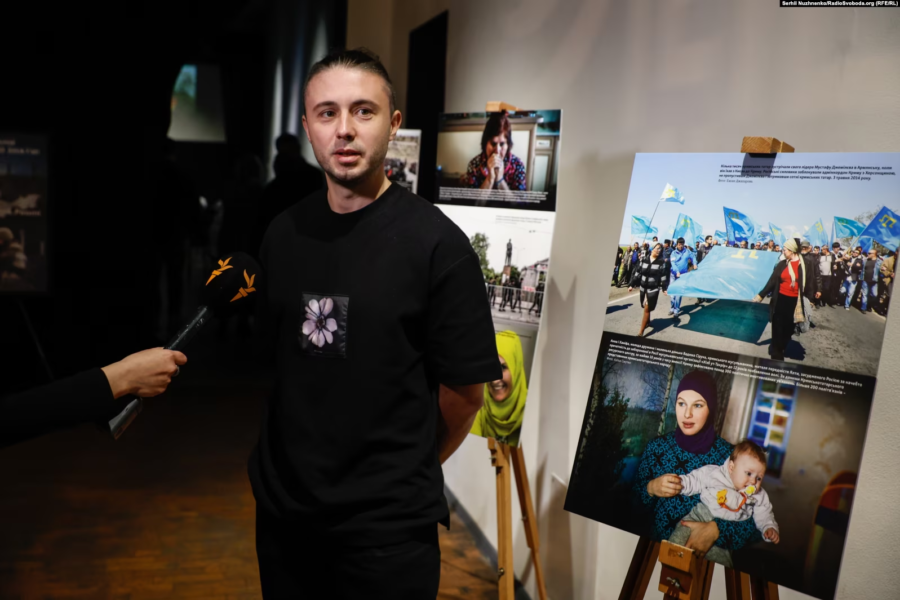 Vocalist of the band “Antytila” Taras Topolia. Photo: Radio Liberty
Vocalist of the band “Antytila” Taras Topolia. Photo: Radio LibertyThe organisers were Crimea.Realities, the Crimean House, and Human Rights Centre ZMINA. During the event, journalists of the Crimean media presented a photo exhibition “10 years of occupation and resistance of Crimea in the photos of Crimea.Realities journalists”, and also held a discussion about the future of the peninsula.
In March of this year, Crimea.Realities turned 10 years old — the informational project of Radio Liberty’s Ukrainian service for Crimeans and for Crimea. From the first days of Russia’s occupation and illegal annexation of the Crimean peninsula until today, the journalists of Crimea.Realities work based on the conviction that Crimeans have the right to know what is really happening on the peninsula occupied by Russia.
During the opening of the photo exhibition “10 years of occupation and resistance of Crimea in the photos of Crimea.Realities journalists”, the Director of the Ukrainian editorial office of Radio Liberty Mariana Drach mentioned the journalists of Crimea.Realities, who worked for years to cover the events in Crimea:
“I am thinking about Vladyslav Yesypenko, who is currently behind bars in Crimea. About front-line correspondent Dmytro Yevchyn, who is now in a Kyiv hospital after being wounded. This is also journalist Pavlo Kazarin, and Emine Dzheppar, a Ukrainian diplomat who previously worked with us and helped start our project. I also want to mention dozens of citizen journalists from “Crimean Solidarity” who helped us develop Crimea.Realities. There is also Mykola Semena, who is now here with us and against whom a criminal case was also initiated in Crimea for his activities.”
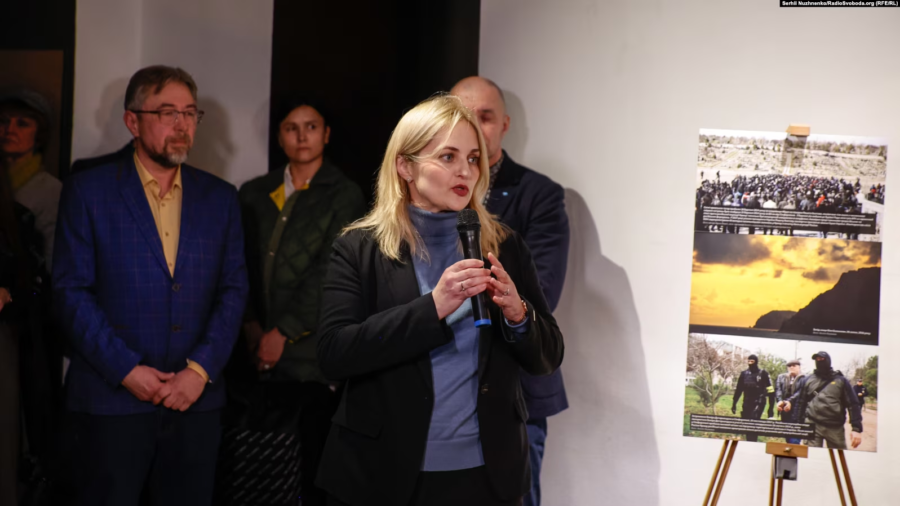 Mariana Drach. Photo: Radio Liberty
Mariana Drach. Photo: Radio LibertyThe Permanent Representative of the President of Ukraine in the Autonomous Republic of Crimea, Tamila Tasheva, noted that Crimea.Realities is a media platform that tells the truth about what is happening on the peninsula and about the realities of life under occupation.
The exhibition presents 26 photographs of Crimea.Realities and Radio Liberty journalists, that show life on the occupied peninsula from 2014 to 2022. Among the authors of the photo are Anton Naumliuk, Stanislav Yurchenko, Alina Smutko, Taras Ibrahimov, Oleksandra Surhan, Emine Dzheppar, Ezabera Pinkhas, Yevhen Zhuk, Anatolii Krymskyi, Volodymyr Prytula and citizen journalists of “Crimean Solidarity”.
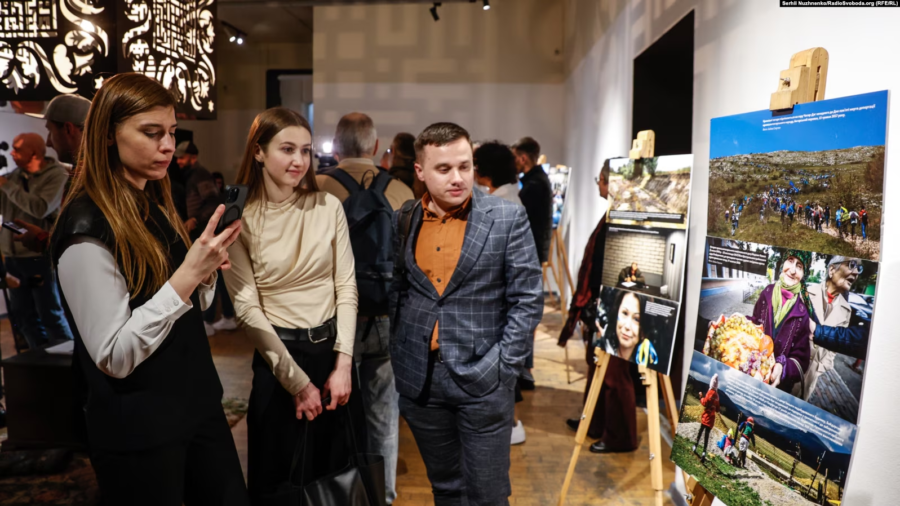 Photo: Radio.Liberty
Photo: Radio.Liberty“Here you can see photos taken by our fellow photographers and journalists during the last ten years in Crimea. This is probably one thousandth of what we could show. This is just a small slice of what actually happened in Crimea during these 10 years. And, unfortunately, not all the authors of these photos were able to come,” Volodymyr Prytula, the Head of Crimea.Realities, told about the photo exhibition.
Also, during the opening of the photo exhibition, the Crimea.Realities team received a special award from the National Union of Journalists of Ukraine for their significant contribution to the establishment of democratic values, freedom of speech, and the fight against disinformation and censorship.
During the discussion “Crimea: visions of the future”, the soloist of the band “Antytila” Taras Topolia noted that Crimea is one of the important components of the future security of Ukraine.
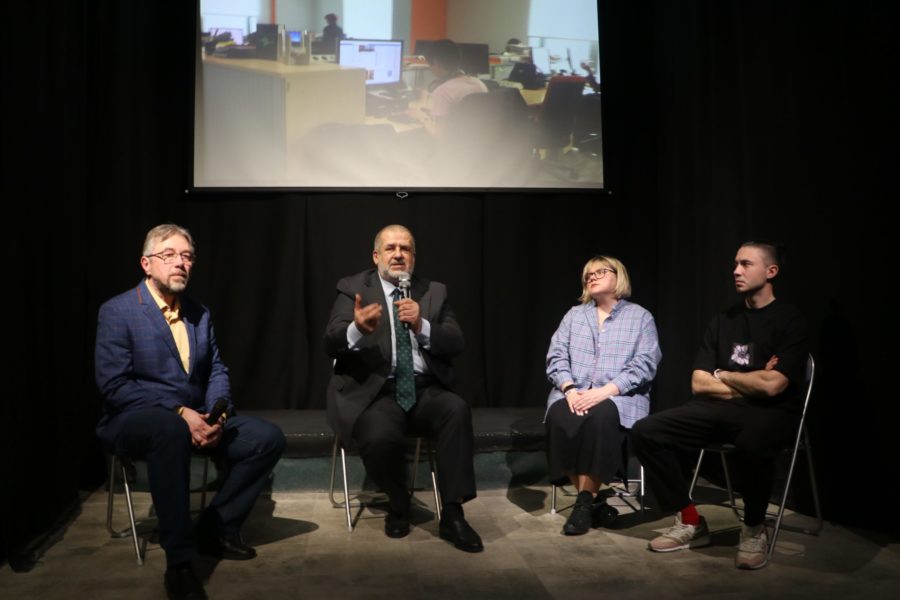 Photo: Iryna Ivanchenko / ZMINA
Photo: Iryna Ivanchenko / ZMINA“Crimea is the economy, it is access to the Black Sea, Crimea is politics, it is the strategy of the entire Black Sea region. And Crimea is the Ukrainians who are there, overcoming pressure, in particular on the press, carrying out resistance, small and huge feats, waiting for Ukraine, waiting for the state to return,” Topolia added.
Speaking about the future of Crimea, the Advocacy Director of Human Rights Centre ZMINA, Alena Lunova, noted that earlier Crimeans did not ask as many questions about their future after the restoration of Ukraine’s territorial integrity as they do now.
“And for us this is an important marker. Because it means that there is a corresponding request to the state. People in Crimea are interested in what will happen to their property, their documents and what awaits them in general. That is, the state has to answer what life will look like in the de-occupied territory, and tell Crimeans that their life will not deteriorate after de-occupation,” Lunova said.
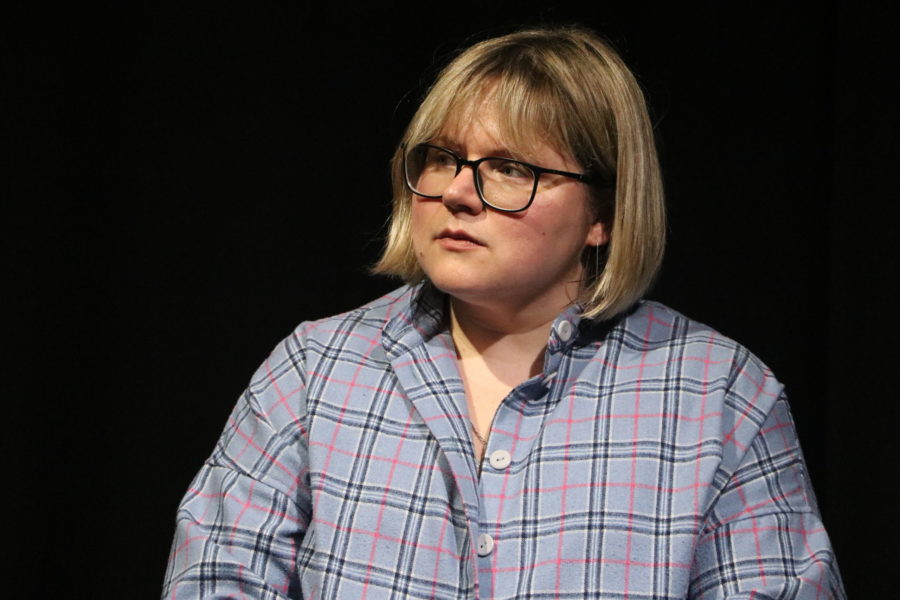 Alena Lunova. Photo: Iryna Ivanchenko / ZMINA
Alena Lunova. Photo: Iryna Ivanchenko / ZMINAThe Head of the Mejlis of the Crimean Tatar People, Refat Chubarov, claims that autonomy, which should strengthen the territorial integrity of Ukraine, is a mandatory factor for the future of Crimea. Also, in his opinion, Ukraine should provide the Crimean Tatars with the right to self-determination.
“The third condition for the future of Crimea is equal rights and freedoms for all who will live in Crimea. The fourth is the sustainable development of Crimea. Without Crimea, there simply won’t be a stable, strong Ukrainian state,” Chubarov is convinced.
You can find the video from the broadcast of the discussion here (in Ukrainian).
If you have found a spelling error, please, notify us by selecting that text and pressing Ctrl+Enter.


